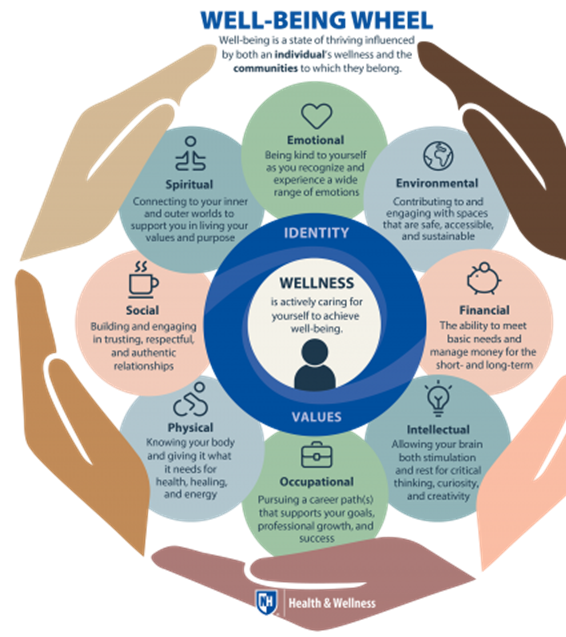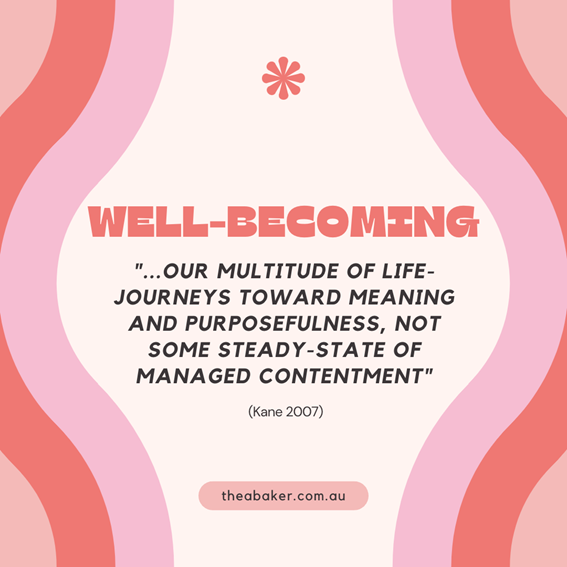Wellbeing or well-becoming?
Wellbeing or well-becoming?
I’ve been doing some research this last little while for a presentation I gave last week about ‘well-becoming’, which is a kind of evolved version of wellbeing. And it’s been really fascinating because I’m always trying to better understand how we might be clarifying what is to be ‘well’ and then I guess how I can better support people in that endeavour. Because who doesn’t want to be well and live well? I mean, I think it’s probably definitely better than the alternative, right? But this is where it already starts to get messy, because words, and what we mean by them, evolve really quickly. And so, what was originally meant to be quite a literal or explanatory term can become super wanky in the blink of an eye. And when it comes to health – mental health especially – I think it’s VERY important that we aren’t glib or coming from a presumptive position of privilege.
So, it’s important that we are clear about our terms, and the language we use. The dictionary definition of ‘wellbeing’ is: “the state of being comfortable, healthy or happy”. My practice being called Thea Baker WELLBEING, so I’m down with the idea that being a well human involves a delicate balancing act of mental, physical, emotional, social, spiritual, financial, environmental, occupational, and intellectual wellbeing (all topics that I work with in session with clients because I believe those components make us human). But I do have a few issues when we don’t fully appreciate the nuance of this word. You see when we refer to a ‘state’ then there’s an implied endpoint being referred to. As if we can get to the special place that is the golden land of ‘wellbeing’ and then all we have to do is to hang onto staying there. Well, I’m not sure that there’s a particular finish-line that we should all be racing towards – because we’re all different and because life is a funny thing sometimes that means that I think we often most ‘well’ when we have successfully managed to learn how to navigate the next bizarre thing that crops up in our lives (hello global pandemic).

I also think that comfort shouldn’t be synonymous with wellbeing. Growth often requires discomfort. Learning new things is almost always uncomfortable to being with. And, what about those times when we are both comfortable and uncomfortable all at the same time? Last week, standing up in a room full of people presenting a session on this exact topic was both anxiety-inducing AND exciting. I was deeply uncomfortable at some points – thoughts like, “did they understand my joke?”, “do they understand my ridiculous English-references?”, “do they all think I’m bonkers?” were running riot for quite a lot of the session, and for quite a few days after. All these were interspersed with moments of pure joy when people laughed or cried at the references I was making, or by the emails I received afterwards thanking me for what I’d shared. Super comfortable.
Then there’s healthy. I could write pages about what it is to be healthy but let’s just agree that ‘healthy’ is a super loaded word that means different things to different people, at different points in time and it intersects with different positions of privilege. One definition of health is the absence of disease or illness. For many of us that is a pretty low bar – but just because we aren’t ill or navigating disease doesn’t automatically mean we are healthy. For others though that feels like an impossible fairytale…but it doesn’t necessarily mean we aren’t unhealthy if we are navigating illness or disease!
Last up there’s happy. Again, there is SO much to say here but to try and be brief – happiness is just one of a whole multitude of feelings that make up the human experience, and I would argue that if we are striving to live a rich, full, and meaningful life then we should be embracing the broadest spectrum of emotions that humanness brings with it. How can we know the beauty of deep love and connection if we have no frame of reference for it? Moreover, we can’t hold onto happiness any more than we can avoid sadness. And if we try to measure our success of living well based on how happy we are then we are setting ourselves up for a very failed existence (more on this next week!).

So, I’m embracing the idea of well-becoming, which is “…our multitude of life-journeys toward meaning and purposefulness, not some steady-state of managed contentment” (Kane 2007). I’m not sure about you, but it gives us the context of what it is to try to navigate whatever being human means in this moment, allowing for wrong-turns, U-turns, and do-overs. And I don’t know anyone who hasn’t needed some of those on their quest to live well.
If this weeks’ blog has brought up something in your life that you’d like the space to explore, we have a team of trauma-informed therapists at Thea Baker Wellbeing and we have IMMEDIATE availability – please reach out to us at: hello@theabaker.com.au / 03 9077 8194.
